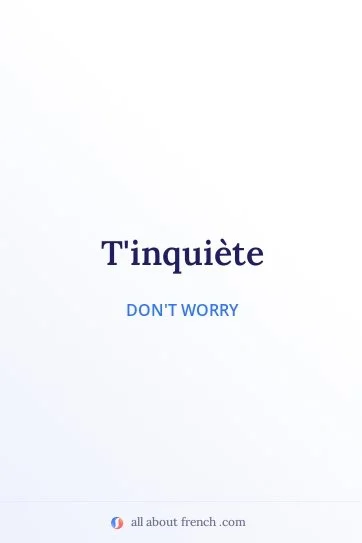
Get ready to learn all the things you need to know about the funny word "T'inquiète". More precisely, this includes a full explanation of what it is and how to use it in a conversation with an audio example. And because we want to help you on your learning journey, we also added useful stuff like synonym, slow pronunciation audio, dialogue example and more!
Translation : Don't worry
Register : Informal - Funny - Slang
Slow
Normal
IPA : / tɛ̃kjɛt /

"T'inquiète" is one informal way to say in French "Don't worry" or "No problem". It's the shortened version of "T'inquiète pas" which is itself the shortened version of "Ne t'inquiète pas" (Don't worry)A good rule of thumb in this case is: "The shorter it is, the more familiar it is".
It's a very popular expression that we use to reassure someone after something happened. Typically: to minimize an issue, clearing up a misunderstanding, or to reassure about our wellness after an unfortunate event.
Let's see some examples!
Scenario 1: a colleague asks you if you will be there at the meeting this afternoon, you can answer: "Oui, ne t'inquiète pas, je serai là." (Yes, don't worry about it, I will be there). Or "N'y pense même pas, j'en ai marre de tes réunions." (Don't even think about it, I'm tired of your meetings.) But that's another story...
Scenario 2: you are falling off stairs and your friend comes to ask you if you are ok. You might say: "T'inquiète, je vais bien." (It's not serious/Don't worry about it, I'm fine)
There is an infinite number of synonyms, here are the most used ones:
Neutral
Informal
Dialogue
Attention ! Tu marches sur mes chaussures !
Be careful! You walk on my shoes!
Je suis désolé, c'est de ma faute
I'm sorry, it's my fault
T'inquiète
Don't worry
Learn French with Audio Stories
Learn French the easy way with our French - English
parallel texts with slow French audio
 Start Learning
Start Learning 